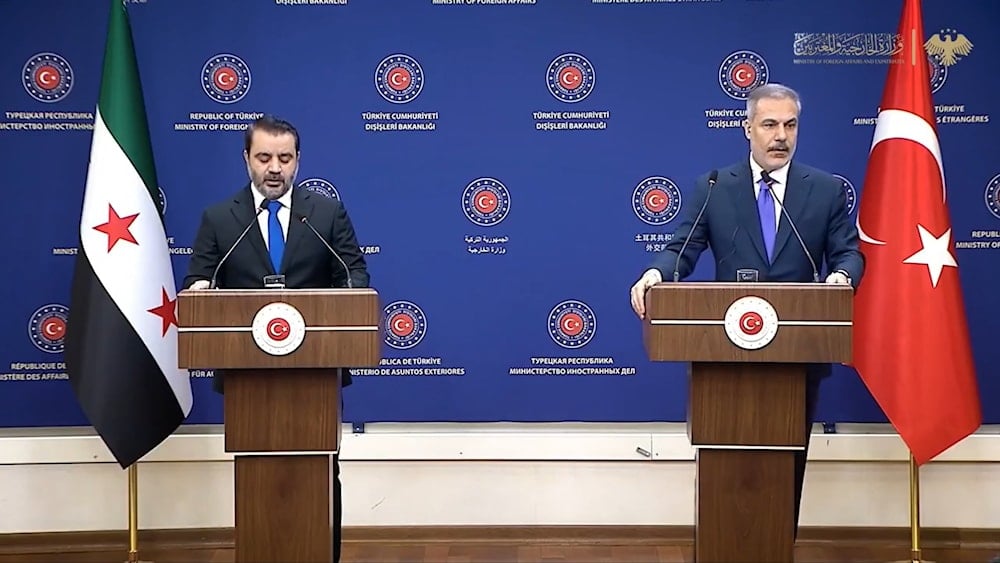Turkey, Syria warn 'Israel' against destabilizing Syrian territory
Turkey and Syria jointly accused "Israel" of deliberately fueling instability to weaken the country, while Ankara renewed its focus on dismantling Kurdish forces.
-

Turkish Foreign Minister Hakan Fidan and his syrian counterpart Hasan al-Shaibani hold a press conference in Ankara, Turkey, August 13, 2025. (Screengrab)
Ankara and Damascus closed ranks on Wednesday to denounce what they described as Israeli efforts to sow chaos in Syria, while demanding an end to all forms of foreign intervention that threaten to prolong the country's instability.
At a joint press conference in Ankara, Turkish Foreign Minister Hakan Fidan said "certain actors are bothered by the positive developments in Syria," naming "Israel" and Kurdish YPG forces operating in the northeast. "Israel is currently one of the biggest actors in this dark picture," he asserted, accusing it of pursuing "chaos in Syria" as part of its own security strategy, a charge that echoes long-standing accusations that Tel Aviv benefits from sectarian fragmentation to weaken and divide neighboring states, consolidating its hold over occupied territories such as the Golan Heights.
Syrian Foreign Minister Asaad al-Shaibani, standing alongside Fidan, warned that "repeated Israeli threats… through airstrikes" remain among the most pressing dangers. "We're facing new challenges that are no less dangerous than those we encountered during the years of war," he said. The statement comes despite the fact that Damascus itself has faced allegations of involvement in bloody sectarian violence, including this year's massacres in the Druze-majority Sweida province.
Fidan cited deadly incidents in Latakia and Sweida, along with the YPG's refusal to integrate into the Syrian state, as indicators of continuing destabilization. "The events in Latakia and Sweida and the failure to integrate the YPG (into the Syrian state) are evidence of the challenges and obstacles facing the positive process under way," he said.
كلمة وزير الخارجية والمغتربين السيد أسعد حسن الشيباني خلال المؤتمر الصحفي الذي جمعه مع نظيره التركي السيد هاكان فيدان في العاصمة التركية أنقرة pic.twitter.com/xcGtmPHwXY
— Abdul Aziz Baraa (@abdulaziz_sy11) August 13, 2025
Kurdish standoff
For Ankara, the Kurdish question overshadows all other priorities in Syria. Turkey views the YPG as inseparable from the PKK, which waged a decades-long insurgency inside Turkey. While the PKK is formally in the process of disbanding under a peace deal, Fidan said there is "no indication" it has ended armed activity or removed foreign fighters from its ranks. "In an environment where Turkey's security demands remain unmet, we have no chance of remaining calm," he warned.
Beneath this rhetoric is a broader geopolitical confrontation: the YPG is the backbone of the US-backed Syrian Democratic Forces, which have controlled much of Syria's oil-rich northeast since ISIS' territorial defeat. While Washington frames its alliance with the Kurds as a counterterrorism necessity, its continued military presence in these areas serves to keep Damascus cut off from key energy resources, sustain economic pressure, and maintain leverage against both Iran and Russia, aims that align with "Israel's" strategic interest in preventing a strong, unified Syria.
On Wednesday, Axios reported that the Trump administration is seeking to negotiate an agreement to establish a humanitarian corridor linking "Israel" to the city of Sweida in southern Syria, purportedly to facilitate aid deliveries to the Druze community there.
Read more: US, 'Israel', Syria to meet in Paris to discuss Sweida aid corridor

 3 Min Read
3 Min Read










